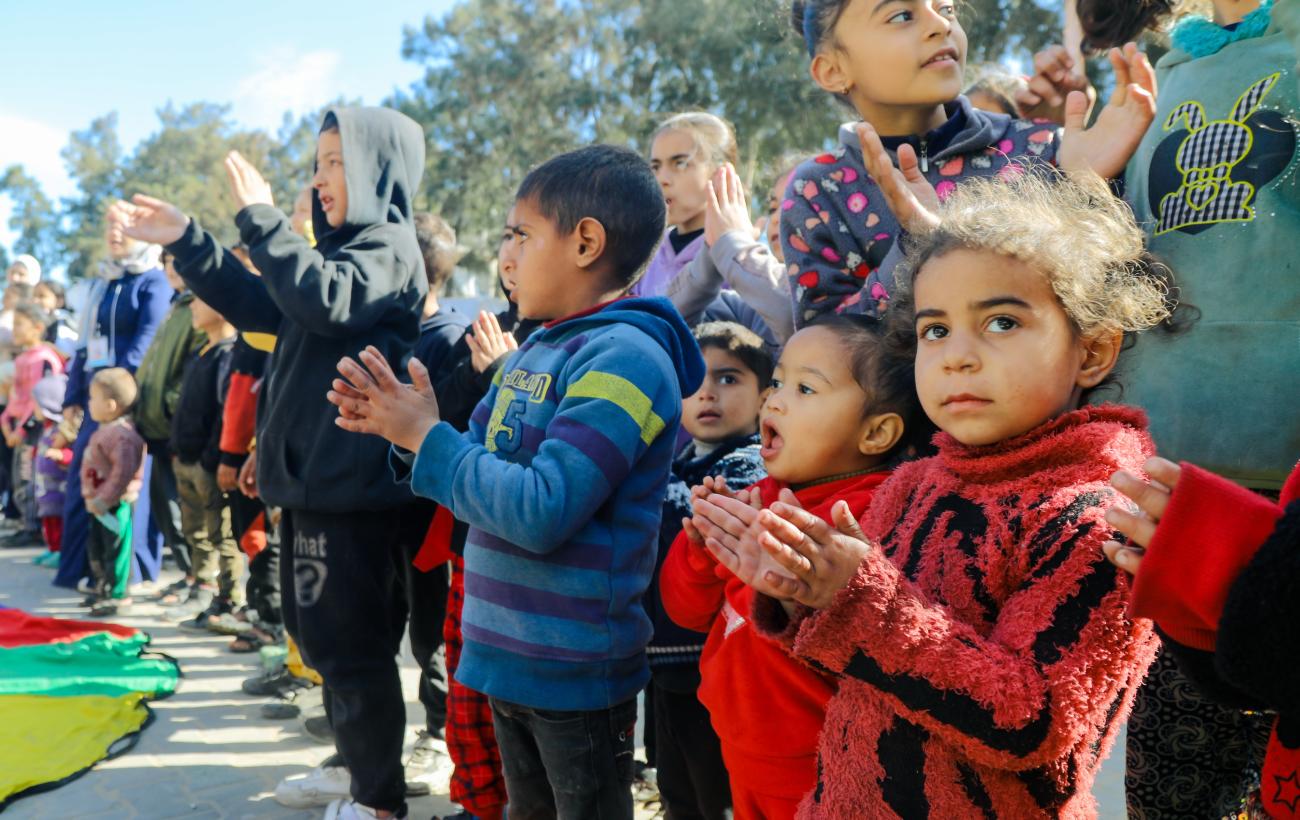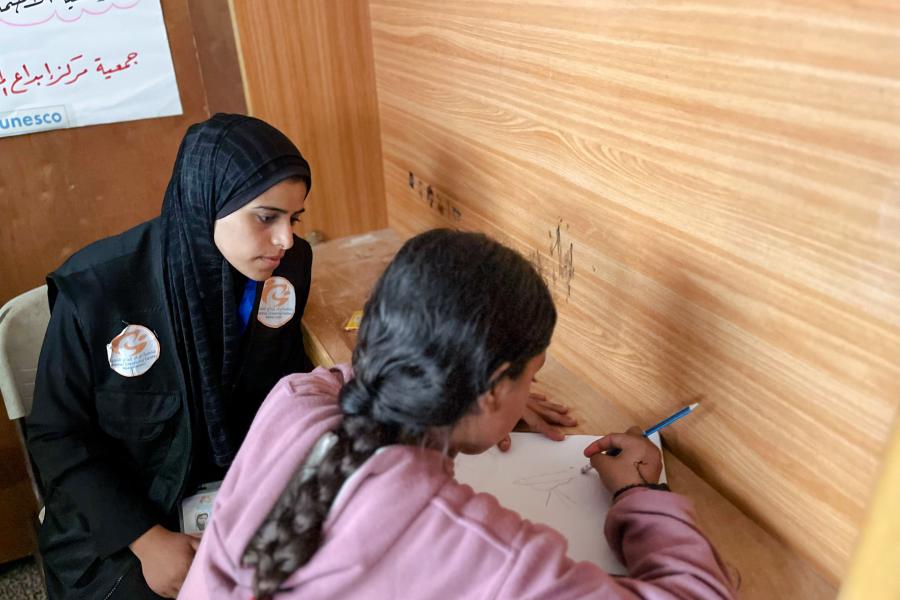Gaza: more than 1,500 children reached by UNESCO’s mental health and psychosocial support

UNESCO has been supporting displaced children and families, helping them cope with the trauma they are enduring.
Supporting children in armed conflict with mental health and psychosocial support is crucial to help them cope and recover from trauma. Following the resolution adopted in November 2023 by the 42nd General Conference of UNESCO, the Organization launched an appeal to its Member States to provide displaced children and their families with mental health and psychosocial support (MHPSS), adapting to emerging needs on the ground.
Since February 2024, a total of 1,580 displaced children have received assistance through UNESCO’s MHPSS initiatives in shelters across Khan Younis and Rafah in the Southern Gaza Strip, in partnership with the Teacher Creativity Center (TCC). Additionally, 810 caregivers have participated in psychosocial support workshops, enhancing their capacity to provide support to both themselves and the children in their care. Thanks to new financial support from Japan and Iceland, UNESCO is scaling up these MHPSS activities.
Some of the children and caregivers who have benefitted from UNESCO’s activities have shared their experiences and outline how the activities have helped them.
“I learned ways to help me feel better.” - Dana
Dana, ten, spent her early years living in China, before her family relocated to the Gaza Strip a year and a half before the conflict broke out. When their house was destroyed, she fled to the south with her brother and mother. However, her father stayed behind to continue his work as a doctor in a hospital in northern Gaza.
News of attacks on the hospital reached Dana’s family who have been displaced in a shelter in Rafah, leaving the ten-year-old terrified for her father’s safety. She could not settle nor adapt to the shelter and their new circumstances. Her mother enrolled her in the MHPSS activities, where she has received individual counselling sessions.
The sessions have helped Dana to explore and express her feelings in an emotionally safe space. She says: "I’m scared for my dad, and I don’t want to be here. I talked about this with my counsellor, and I learned ways to help me feel better." Dana - participant in UNESCO's MHPSS activities in the Gaza Strip

"Sometimes I’m just really sad.” - Salma
Salma has endured immense suffering. Originally from Gaza City, her father, younger brother and many other members of her father’s family have been killed in the hostilities. Her family home was also destroyed by an airstrike, and she was forced to flee south. Displaced twice more, the ten-year-old eventually ended up in a shelter in Rafah with her mother.
She explains the impact the conflict has had on her: "I feel like my personality was destroyed. I lost a lot of my family. Sometimes I’m just really sad. I get a headache and I’m tired.” Salma - participant in UNESCO's MHPSS activities in the Gaza Strip
Salma took part in the psychosocial support activities implemented in her shelter by UNESCO and TCC. Through art, free expression, and relaxation techniques, Salma’s mother has noticed improvements in her emotional state.
"We’ve seen a positive change in him.” - Abdulhadi's father
Following multiple displacements and his family’s futile search for a safe place in the Gaza Strip, ten-year-old Abdulhadi was experiencing anger and anxiety. His family was extremely concerned that he was not adapting to staying in the shelter in Rafah, and he took part in individual counselling sessions.
The sessions concentrated on managing anger and other strong emotions and provided Abdulhadi an open environment to understand his feelings and fears. Noticing a positive change in Abdulhadi, his father says: "He’s much calmer now and has made friends here in the shelter. His outlook is more positive than it was before, despite the circumstances." Father of Abdulhadi, who took part in UNESCO's MHPSS activities in the Gaza Strip.

“I just want to play again.” - Samira
Eleven-year-old Samira*, who has been in a shelter with her family, was left traumatized by her brother’s death, as well as the ongoing conflict and her family’s displacement from their home and all that was familiar to her.
Worried about her daughter, Samira’s mother enrolled her in the mental health and psychosocial support activities taking place in the shelter.
During the first group session, the children were invited to represent their feelings through art and Samira drew her brother’s body. She was exhibiting signs of deep fear and sadness. Throughout the group and individual sessions, counsellors talked Samira through her emotions, which has helped her to process the immensely distressing events she has been through.
Samira says: "I think about my brother in heaven a lot. But I’ve made new friends from the group, and I spend more time with my family. I feel a bit better now. I just want to play again." Samira - participant in UNESCO's MHPSS activities in the Gaza Strip
"Not every thought we have will come true." - Nada
Nada’s mother was killed in Jabalia. Now, Nada feels sad when she sees other children’s mothers taking care of them.
“I can’t believe she’s dead,” says ten-year-old Nada.
She was displaced with her father, younger brother and aunts to a shelter in the southern Gaza Strip where she became increasingly isolated and struggled with nightmares. She was enrolled in group and individual counselling sessions to help her to express her emotions and cope with her grief.
Through play, recreational activities and sharing her emotions with both peers and counsellors, Nada has worked through many of her fears and formed new friendships.
Nada says: "When I talked and drew with the other children, I began to understand that not every thought we have will come true. I feel comfortable when we talk and when we draw.” Nada - participant in UNESCO's MHPSS activities in the Gaza Strip
Nada’s aunt, as a primary caregiver, has also taken part in sessions to learn more about the symptoms and risks of trauma, and how she can best respond. Nada is now having fewer nightmares, and the family just wishes for an end to the conflict.
*Some Names have been changed to protect identity.
UNESCO’s action in the Gaza Strip/ Palestine
The operations of the Israeli army in the Gaza Strip, in the wake of the acts of terror committed by Hamas against Israeli civilians on 7 October 2023 have caused a dramatic humanitarian crisis impacting all aspects of civilian life.
UNESCO, including its office in Ramallah, is mobilized to respond within the framework of its mandate for education, culture and press freedom in Gaza.
In the West Bank, where tension and violence have escalated since the war began, UNESCO also continues to collaborate with its partners to provide support to the Palestinian people across the main areas of UNESCO’s expertise.

